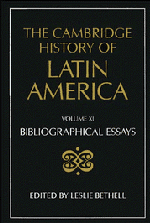Book contents
- Frontmatter
- I THE INDIGENOUS PEOPLES OF MIDDLE AND SOUTH AMERICA ON THE EVE OF THE CONQUEST
- II COLONIAL SPANISH AMERICA
- III COLONIAL BRAZIL
- IV THE INDEPENDENCE OF LATIN AMERICA
- V LATIN AMERICA: ECONOMY, SOCIETY, POLITICS, c. 1820 TO c. 1870
- VI LATIN AMERICA: ECONOMY, SOCIETY, POLITICS, c. 1870 to 1930
- VII LATIN AMERICA: ECONOMY, SOCIETY, POLITICS, 1930 to c. 1990
- 1 Population
- 2 The Latin American economies, 1929–1939
- 3 The Latin American economies, 1939–c. 1950
- 4 The Latin American economies, 1950–1990
- 5 Urban growth and urban social structure
- 6 Agrarian structures
- 7 State organization
- 8 Democracy
- 9 The Left
- 10 The military in politics
- 11 The urban working class and labour movements
- 12 Rural mobilizations
- 13 Women in twentieth-century Latin America
- 14 The Catholic church
- 15 The Protestant churches
- 16 Mexico, c. 1930–1946
- 17 Mexico since 1946
- 18 Central America
- 19 Guatemala
- 20 El Salvador
- 21 Honduras
- 22 Nicaragua
- 23 Costa Rica
- 24 Panama
- 25 The Panama Canal Zone, 1904–1979
- 26 Cuba, c. 1930–1959
- 27 Cuba since 1959
- 28 The Dominican Republic
- 29 Haiti
- 30 Puerto Rico
- 31 Argentina, 1930–1946
- 32 Argentina since 1946
- 33 Uruguay
- 34 Paraguay
- 35 Chile, c. 1930–c. 1960
- 36 Chile since c. 1960
- 37 Peru, 1930–c. 1960
- 38 Peru since c. 1960
- 39 Bolivia
- 40 Colombia
- 41 Ecuador
- 42 Venezuela
- 43 Brazil
- VIII IDEAS IN LATIN AMERICA SINCE INDEPENDENCE
- IX LATIN AMERICAN CULTURE SINCE INDEPENDENCE
- X THE INTERNATIONAL RELATIONS OF LATIN AMERICA SINCE INDEPENDENCE
- THE CAMBRIDGE HISTORY OF LATIN AMERICA
14 - The Catholic church
from VII - LATIN AMERICA: ECONOMY, SOCIETY, POLITICS, 1930 to c. 1990
Published online by Cambridge University Press: 28 March 2008
- Frontmatter
- I THE INDIGENOUS PEOPLES OF MIDDLE AND SOUTH AMERICA ON THE EVE OF THE CONQUEST
- II COLONIAL SPANISH AMERICA
- III COLONIAL BRAZIL
- IV THE INDEPENDENCE OF LATIN AMERICA
- V LATIN AMERICA: ECONOMY, SOCIETY, POLITICS, c. 1820 TO c. 1870
- VI LATIN AMERICA: ECONOMY, SOCIETY, POLITICS, c. 1870 to 1930
- VII LATIN AMERICA: ECONOMY, SOCIETY, POLITICS, 1930 to c. 1990
- 1 Population
- 2 The Latin American economies, 1929–1939
- 3 The Latin American economies, 1939–c. 1950
- 4 The Latin American economies, 1950–1990
- 5 Urban growth and urban social structure
- 6 Agrarian structures
- 7 State organization
- 8 Democracy
- 9 The Left
- 10 The military in politics
- 11 The urban working class and labour movements
- 12 Rural mobilizations
- 13 Women in twentieth-century Latin America
- 14 The Catholic church
- 15 The Protestant churches
- 16 Mexico, c. 1930–1946
- 17 Mexico since 1946
- 18 Central America
- 19 Guatemala
- 20 El Salvador
- 21 Honduras
- 22 Nicaragua
- 23 Costa Rica
- 24 Panama
- 25 The Panama Canal Zone, 1904–1979
- 26 Cuba, c. 1930–1959
- 27 Cuba since 1959
- 28 The Dominican Republic
- 29 Haiti
- 30 Puerto Rico
- 31 Argentina, 1930–1946
- 32 Argentina since 1946
- 33 Uruguay
- 34 Paraguay
- 35 Chile, c. 1930–c. 1960
- 36 Chile since c. 1960
- 37 Peru, 1930–c. 1960
- 38 Peru since c. 1960
- 39 Bolivia
- 40 Colombia
- 41 Ecuador
- 42 Venezuela
- 43 Brazil
- VIII IDEAS IN LATIN AMERICA SINCE INDEPENDENCE
- IX LATIN AMERICAN CULTURE SINCE INDEPENDENCE
- X THE INTERNATIONAL RELATIONS OF LATIN AMERICA SINCE INDEPENDENCE
- THE CAMBRIDGE HISTORY OF LATIN AMERICA
Summary
The historiography and social science literature on the Catholic church in Latin America since 1930 is large and unsatisfactory. There are two main reasons why it is unsatisfactory. First, most ecclesiastical archives, especially that of the Vatican, remain closed to scholars for this period. Secondly, most of the publications on the subject since the late 1960s have been written from the partisan perspectives of the Catholic Left and Catholic Right. From these have emerged two orthodoxies: the one perceiving the diffusion of a ‘theology of liberation’ as a radical break with five gloomy centuries of overidentification of the Roman Catholic church in Latin America with encrusted and oppressive power structures; the other, with equal rigidity, seeing the changes of the 1960s and 1970s as posing a grotesque challenge from within to the creative traditions of five centuries of self-abnegating missionary activity. Both of these orthodoxies are highly critical in tone; neither is self-critical in spirit. Few attempts have been made to examine the cumulative significance of the sequence of small changes in the church between 1930 and the early 1960s. No serious attempt has been made to challenge the assumption that a major transformation occurred in the church in the 1960s and 1970s, or, if it occurred, to identify and quantify in how many parishes and among how many Catholics it had a profound impact.
- Type
- Chapter
- Information
- The Cambridge History of Latin America , pp. 659 - 667Publisher: Cambridge University PressPrint publication year: 1995



